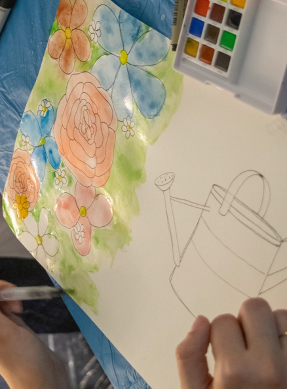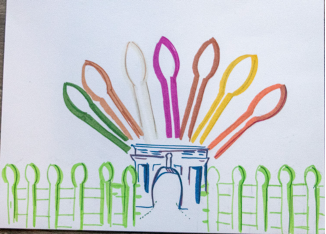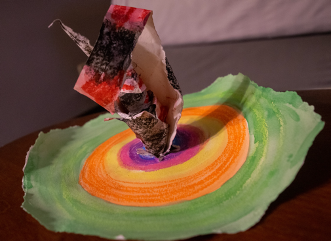July 24, 2024 | By Suzanna Anderson, Juliet L King, Jill McNutt, Sarah Deaver, and Leara Glinzak, AATA Research Committee Members
At the American Art Therapy Association (AATA) conference in 2022, members of the Research Committee along with past president Girija Kaimal led a workshop titled Where We Are Headed: Revitalizing the Research Mission of AATA.The presenters reviewed the AATA Research Committee mission and vision statements and engaged the audience in collaborative discussion and experiential art making around the importance of art therapy research for clinicians, students, and clients. Based on the discussions at this workshop, the Research Committee is advocating for research to be its own pillar in the overall AATA Strategic Plan.
Identifying Themes During the Workshop
The attendees explored the intersectionality of the AATA mission, vision, and perceptions of barriers to engaging in research through response artmaking and conversations in small groups and the group at large.
Participants provided consent for photographs of the artwork and transcripts from the event to be analyzed to explore the information generated during the event. Some art therapists also included words in their imagery which were also taken into account in the qualitative review. Participants also provided consent to utilize the images and transcripts for this review. Two art therapists cross-analyzed the material to alleviate bias. Four common priorities emerged from the analysis: Opportunity (accessibility and barriers), Mentorship (nourishment, preparation, consistency, alignment), Collaboration (network, people, peripheral relationships, collaboration), and Outreach (audience and professional presentation).
- Opportunity: This theme focused on ensuring accessibility and breaking down barriers that might hinder art therapists from engaging in research. The theme involved creating environments and cultivating resources that encourage clinician-researcher collaboration.
- Mentorship: This theme included the necessary nourishment, preparation, consistency, and alignment necessary for art therapy research collaborations. Art therapy research mentors provide guidance, support, and encouragement to help individuals develop and formulate necessary skills required for research. Consistent mentorship encourages ongoing growth and alignment with personal and professional aspirations.
- Collaboration: This theme emphasized the importance of networks, relationships, and collaboration in fostering art therapy research. Collaboration includes leveraging peripheral relationships and diverse perspectives to enhance opportunities, along with relevant stakeholders from other disciplines that contribute to expanding the art therapy worldview in complementary ways.
- Outreach: Outreach involves engaging with audiences within and beyond the art therapy community and presenting work in a range of professional contexts. Outreach involves connecting with others who share similar interests and values, as well as reaching out to new audiences to expand the impact of art therapy research methods and strategies. Dissemination of research findings was noted as crucial to outreach endeavors.
Questions that were raised during the workshop discussions included:
- How does research matter for the art therapy profession?
- How do clinicians in the field attain opportunities and resources to contribute to research?
- How do the results of research get shared with the public?
- What is the action plan to conduct more art therapy research?
- Are there barriers to conducting research? What are they?
- How can art therapy research become more accessible?
What We Learned
Overall, the current goals of the Research Committee aligned with the workshop results. These include providing art therapy clinicians with more opportunities for professional growth and development by collaborating with academic researchers/institutions. Art therapists can enhance their skills and knowledge, develop research plans and process decision making regarding future academic and doctoral work through structured mentorship programs. The workshop highlighted the need to build bridges between community and mental health practitioners with those in academia, creating pathways for collaboration and knowledge exchange. The workshop also illuminated the need for presenting art therapy research, allowing clinicians to showcase their work and contribute to the growing body of knowledge. Connecting researchers with other researchers and clinicians fosters collaboration and development of research programs and opportunities.
Moving forward, we propose that research to be its own pillar in the overall AATA Strategic Plan.
Sample images from participants:

Theme of Opportunity

Theme of Mentorship

Theme of Collaboration

Theme of Outreach
